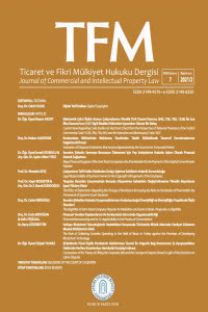TÜRKİYE’DE SOSYAL PİYASA EKONOMİSİNİN SAĞLANMASINDA HAKSIZ REKABET İLE REKABETİN KORUNMASINA İLİŞKİN DÜZENLEMELERİN ROLÜ
Türkiye Cumhuriyeti Anayasası karma ekonomiyi benimsemiş olup, Anayasa’nın 2. maddesi de Türkiye Cumhuriyeti’nin bir sosyal hukuk devleti olduğunu ifade etmektedir. Sosyal devlet olmak, bu niteliğin, diğer alanların yanı sıra ekonomiye de yansıtılmasını gerektirir. Dolayısıyla, Türkiye Cumhuriyeti Devleti Anayasası’nın rekabet politikası bağlamında sosyal piyasa ekonomisini tercih ettiğini söylemek yanıltıcı olmayacaktır. Rekabet hukuku ve haksız rekabet hukuku hükümleri, piyasa aktörleri ve toplum refahı için piyasanın rekabet ihlallerine karşı korunması hedefinde birleşmekte ve bu amaç açısından birbirlerini tamamlayıcı özellik göstermektedir. Rekabet hukuku, rekabet ortamını ihlâllere karşı korurken, haksız rekabet hukuku, dürüstlük kuralına aykırı ticari davranışları yasaklamak suretiyle adil rekabet ortamının sağlanmasına hizmet eder. Türk hukukunun, rekabet hukukuna ve haksız rekabet hukukuna ilişkin hükümlerine genel olarak bakılması, söz konusu düzenlemelerin aynı amaca yöneldiğinin anlaşılması için yeterlidir. Sosyal piyasa ekonomisi üzerine inşa edilmiş bir sistemde, rekabet hukuku ile haksız rekabet hukuku hükümlerinin işbirliği, özgür rekabet ortamının sağlanması ve korunması açısından büyük önem taşımaktadır.
ROLES OF UNFAIR COMPETITION AND PROTECTION OF COMPETITION RULES IN THE ATTAINMENT OF SOCIAL MARKET ECONOMY IN TURKEY
Turkish Constitution embraces a mixedeconomy, and Article 2 of the Turkish Constitutionstates that the Turkish Republic is a social law state.The latter characterization requires, among otherthings, the enactment of laws that are able to projectthe “social” aspect of the State to the economy.Consequently, it would not be misleading to assertthat the consitutional regulation of Turkey indicatesthe preference of social market economy as theinstitutional order of competition.Competition and unfair competition law rulesare complementary to each other with the aim ofprotection of competition against infringements, tothe benefit of market agents and public welfare. Whilecompetition law protects freedom of competitionagainst breaches, unfair competition law protects faircompetition against unfair commercial practices. Abird’s eye view of the rules regarding Protection ofCompetition and Unfair Competition in TurkishLaw is sufficient to realize that they comprise ofprovisions that have consentaneous aims.In a system established upon social marketeconomy, competition law and unfair competitionlaw together play a significant role in the attainmentof freedom of competition and maintenance ofcompetitiveness of the market.
___
- Ahrens, Joachim (2008) Transition Towards a Social Market Economy: Limits and Opportunities PFH Forschungspapiere/Research Papers, Private Fachhochschule Göttingen, No. 2008/01.
- Aşçıoğlu Öz, Gamze (2000) Avrupa Topluluğu ve Rekabet Hukukunda Hâkim Durumun Kötüye Kullanılması, Rekabet Kurumu Yayınları, Lisansüstü Tez Serisi No: 4, 2000.
- Baudenbacher, Carl (2001) Lauterkeitsrecht, Basel, Helbing Lichtenhahn Verlag.
- Berger, Mathis (1995) “Über das Verhältnis zwischen dem Gesetz gegen den unlauteren Wettbewerb und dem Kartellgesetz” Aktuelle Fragen zum Wirtschaftsrecht zur Emeritierung von Walter R. Schluep, 31 ff.
- Callmann, Rudolf (1968) “Unfair Competition and Antitrust: Coexistence Within Complementary Goals”, Antitrust Bulletin, V. 13, Issue 4, p. 1335- 1346.
- Dornis, Tim W. (2017) Trademark and Unfair Competition Conflicts, Historical-Comparative, Doctrinal, and Economic Perspectives, Cambridge, United Kingdom; New York: Cambridge University Press.
- Emmerich, Volker (2008) Kartellrecht, 11. Aufl., München, Verlag C.H. Beck.
- Emmerich, Volker (2009) Unlauterer Wettbewerb, 8.Aufl., München, Verlag C.H. Beck (abb: Wettbewerb).
- Erdem, Ercüment (2002) “Rekabet Hukuku ve Haksız Rekabet İlişkisi” Ömer Teoman’a 55. Yaş Günü Armağanı, V. 1, p. 377-398.
- Ertan, Füsun Nomer (2016) Haksız Rekabet Hukuku (6102 sayılı Türk Ticaret Kanunu’na Göre), İstanbul, On İki Levha Yayıncılık.
- Gürzumar, Osman Berat (2006) Zorunlu Unsur Doktrinine Dayalı Sözleşme Yapma Yükümlülüğü, Ankara, Seçkin Yayıncılık.
- Immenga, Ulrich & Mestmäcker, Ernst-Joachim (Editör) (2012) Wettbewerbsrecht: Band 1. EU/Teil 1, 5. Aufl., München, Verlag C.H. Beck.
- İnan, Nurkut (1999) “Rekabet Hukukunun Diğer Disiplinlerle İlişkisi” Rekabet Kurumu Perşembe Konferansları, V. 1, p. 3-30.
- Jung, Peter & Spitz, Philippe (2010) Bundesgesetz gegen den unlauteren Wettbewerb (UWG), Bern, Stämpfli Verlag.
- Köhler, Helmut (2005) “Zur Konkurrenz lauterkeitsrechtlicher und kartellrechtlicher Normen”, WRP, p. 645 – 654.
- Köhler, Helmut & Bornkamm, Joachim & Feddersen, Jörn (Editör) (2017) Beck’sche Kurz-Kommentare; Band 13a, Gesetz gegen den unlauteren Wettbewerb: UWG mit PAngV, UKlaG, DL-InfoV, Aufl. 35, Verlag C.H. Beck.
- Pınar, Hamdi (2006), “Fikri Mülkiyet Hakları ve Rekabet Hukuku” Rekabet Dergisi, Issue 23, p. 30-86.
- Pınar, Hamdi (2014) “Rekabet Hukuku ile Haksız Rekabet Hukuku İli şkisi” Rekabet Dergisi, V. 15, Issue. 2, p. 59-87.
- Piper, Henning & Ohly, Ansgar & Sosnitza, Olaf (Editör) (2010) Gesetz gegen den unlauteren Wettbewerb, 5. Aufl., München, Verlag C.H. Beck.
- Şenocak, Kemal (2001) “İşletme Personelinin Ayartılması Meselesinin Haksız Rekabet Hükümleri Çerçevesinde (TTK m. 56 vd.) Değerlendirilmesi” AÜHFD, V. 50, Issue 2, p. 193-246.
- Şenocak, Kemal (2009) “Haksız Rekabet Açısından Boykot” BATİDER, V. 25, Issue 1, p. 67- 95.
- Türk, Hikmet Sami (1985), “Sosyal Piyasa Ekonomisinde Rekabetin Düzenlenmesi” BATİDER, V. XIII, Issue 2, p. 119-132.
- Türkkan, Erdal (2009) Nasıl Bir Rekabet Vizyonu?, Ankara, Rekabet Kurumu.
- ISSN: 2149-4576
- Yayın Aralığı: Yılda 2 Sayı
- Başlangıç: 2015
- Yayıncı: Ankara Yıldırım Beyazıt Üniversitesi Hukuk Fakültesi
Sayıdaki Diğer Makaleler
NESNELERİN İNTERNETİ VE PATENTLER : NESNELERİN İNTERNETİ PATENT SAVAŞLARINA DOĞRU?
Disrupting the Traditional Patent System: The Emergence of New Models
Elif Cemre HAZIROĞLU, Hamdi PINAR
Internet of Things and Patents: Towards The IoT Patent Wars?
MARKALARIN BİRLİKTE VAR OLMA SÖZLEŞMESİ
